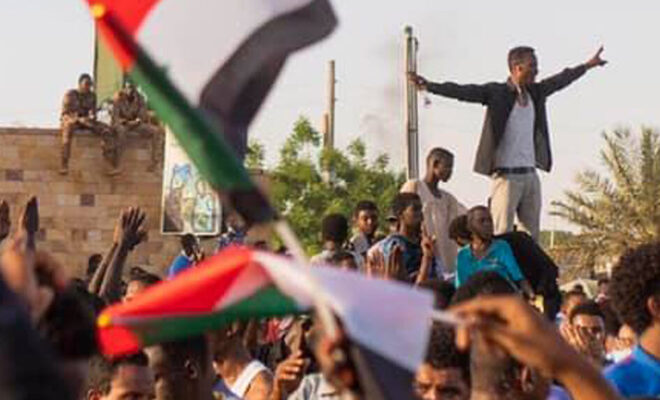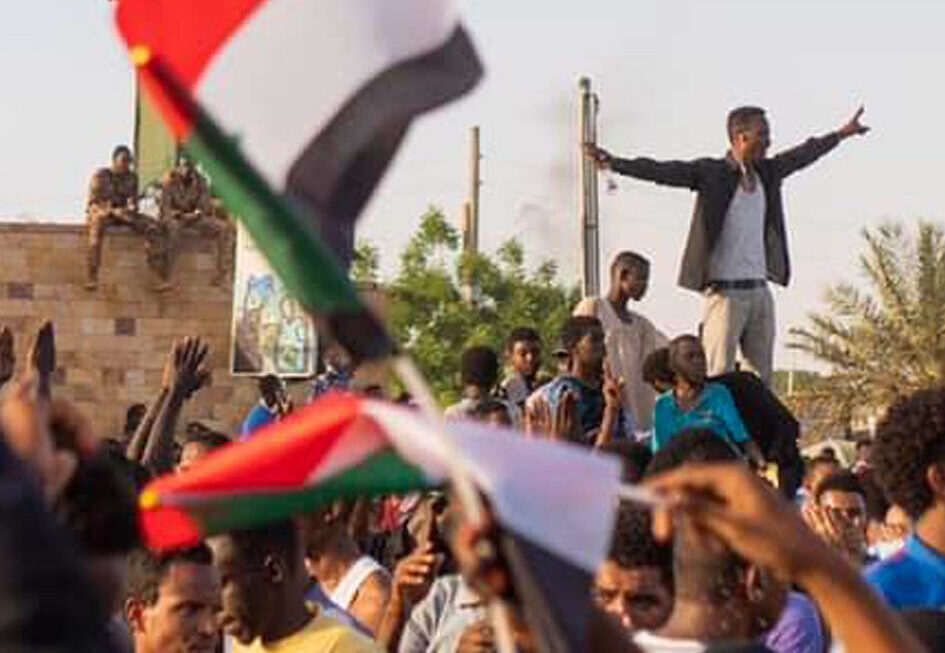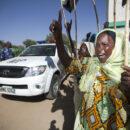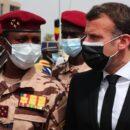Sudan: Revolutionary reflections, amid a raging war

If the popular revolution of 2019 was badly undermined by its rejection of representative politics, how can it be revived?

Protesters in Khartoum celebrating the fall of Omar al-Bashir, July 2019. Courtesy: Prachatai
The current fighting between military factions in Sudan must be seen against the backdrop of the Sudanese revolution that started in December 2018. This popular revolt against the entire power system led to the fall of the dictator Omar al-Bashir in April 2019. A joint civilian-military transitional government was established to lead the transition to democracy, but in October 2021 a military coup occurred that ousted the civilian goverrnment led by Abdalla Hamdok and cancelled the elections planned for 2022. The two factions currently fighting – the Sudan Armed Forces under command of General Abdel-Fattah al-Burhan, and the Rapid Support Forces (RSF) under command of ‘Hemeti’ (Mohamed Hamdan Dagalo) – then shared power in a supreme military council, with Burhan president and Hemeti vice-president of the council.
The coup seemed to kill the democratic transition, but it did not dismantle the infrastructure of the popular revolt. Years of neoliberal reforms under the guidance of the IMF and World Bank had hollowed out the state, meaning that Sudanese society before and during the revolution had developed institutions of self-rule. These were epitomised by the resistance committees that sprang up throughout Sudan to coordinate the protest movement. These continued to function largely undisturbed by military rule when I visited the capital Khartoum in April and May 2022. A European ambassador pointed out to me that the coup leaders had grabbed power to rule, but not to govern Sudanese society. The military government had no inclination to respond to the needs of the population: it focused on dividing the spoils of power. This is what the current fighting is entirely about.
Sudan used to have one of the better-functioning states in Africa, including an expansive public sector. Al-Bashir’s own coup, which brought to power the National Islamic Front led by Hassan al-Turabi in 1989, abused state power to militarise and Islamise society. The strong state became a rogue one in Western eyes when Sudan sided with Islamists, and it was hit by sanctions and covert warfare from the mid-1990s onwards.
Al-Bashir gradually changed sides in the Global War on Terror and, by allowing the secession of South Sudan in 2011, gained the favour of Western countries. Capital started flowing into the country, conditional on structural reform. Like in other strong states being dismantled, a small military-business oligarchy captured the privatised state assets while plunging the country into unsustainable levels of debt.
The resulting macroeconomic growth drew plaudits from international experts, but the introduction of large-scale commercial agriculture led not only to ecocide but also to a rural exodus, swelling the cities, in particular Khartoum’s metropolitan area. With the shrinking of public expenditure for education, health, and the rapidly rising prices due to the elimination of subsidies and social protection measures, the urban poor turned to systems of self-help. The population came to despise the ruling class, and many local and some nationwide revolts took place in the 2010s. A new round of IMF-imposed austerity measures led to a massive revolt in 2018. The population congregated in peaceful and rather joyful sit-ins demanding the ouster of the Al-Bashir regime.
To the surprise of many, the military ousted their long-time leader and arrested Al-Bashir in an attempt to control the situation. But their subsequent heavy-handed repression of demonstrations backfired and they had to surrender, under international pressure, to civilian rule. A civilian government led by the UN senior civil servant, Hamdok, was appointed. Despite manifestly good intentions and the support of the population, Hamdok’s civilian government lacked leadership and made little progress in its goal of reforming political life.
A characteristic of the Sudanese popular revolution that can also be found in other regional movements, such as Tishreen in Iraq and Lebanon’s 17 October movement – but also among France’s Yellow Vests – is the rejection of representative politics. The Sudanese revolution hinges on the activities of resistance committees, which are horizontal local assemblies of the population. Consisting of volunteers, these organise protests but also self-help systems, distribution of aid, provision of basic services, and the maintenance of public infrastructure – roles abandoned by the government. In Omdurman, for example, I visited a thriving cultural centre established in an abandoned building, entirely restored and managed by members of the local resistance committee.
The resistance committees seem to function well but refuse to appoint representatives, as the population has lost confidence that when dealing with power structures, their appointees still represent them. For the UN, African Union, European Union, US and other international actors, this lack of representation made the democratic transition hard to manage. The Sudanese Professionals Association and the Forces for Freedom and Change, two of the driving forces of the revolution, did not seek to capture power or lead the transition. The few leaders of these organisations that did enter the political arena soon lost their constituencies.
The biggest mistake, all Sudanese civilian forces now agree, was to accept the military as partners in the transition. The military have ruled Sudan, either directly or through their overbearing influence on civilian governments, since its independence in 1956. Thanks to neoliberal reforms and the ouster of Al-Bashir, they now also own a large share of national assets and run most of the economy.
The option to establish a purely civilian government after the fall of Al-Bashir was never considered. Egypt, Saudi Arabia and the UAE, concerned about the impact of a democratic revolution in Sudan on their own domestic affairs, insisted that the military be part of the solution, and the international community agreed.
The democratic revolution in Sudan is not dead, but it has stalled. The Coordination of the Resistance Committees of Khartoum State has demanded an end to the fighting, a dissolution of the ‘Janjaweed’ (now RSF) and the return of the armed forces to their barracks. They have called upon local resistance committees to provide medical and food relief to the population, and collect accurate information about the fighting and local conditions to avoid false rumours. But all civilian forces in Sudan have lost hope. Who will stop the fighting between military factions? How to avoid Sudan’s disintegration into regions ruled by gunmen, like in Libya?
If the international community cares about Sudan, it should take measures to isolate and sanction all Sudanese armed forces engaged in the current conflict, confiscate their foreign assets, and return them to the Sudanese people. Regional powers should not be allowed to meddle in Sudan, and certainly not be given a leading role in devising a political outcome.
Instead, the healthy democratic spirit evidenced by Sudanese youth and civil society activists over these past years must form the basis for a national settlement, based on a process of dialogue excluding all armed forces, that the European Union, UN and other international players could support. This may require accepting an alternative to the system based on representation and multi-party elections that has become the universal norm. Dismantling the influence of the army over the society and economy will be a delicate task that requires a long-term commitment by international supporters of the Sudanese people.






